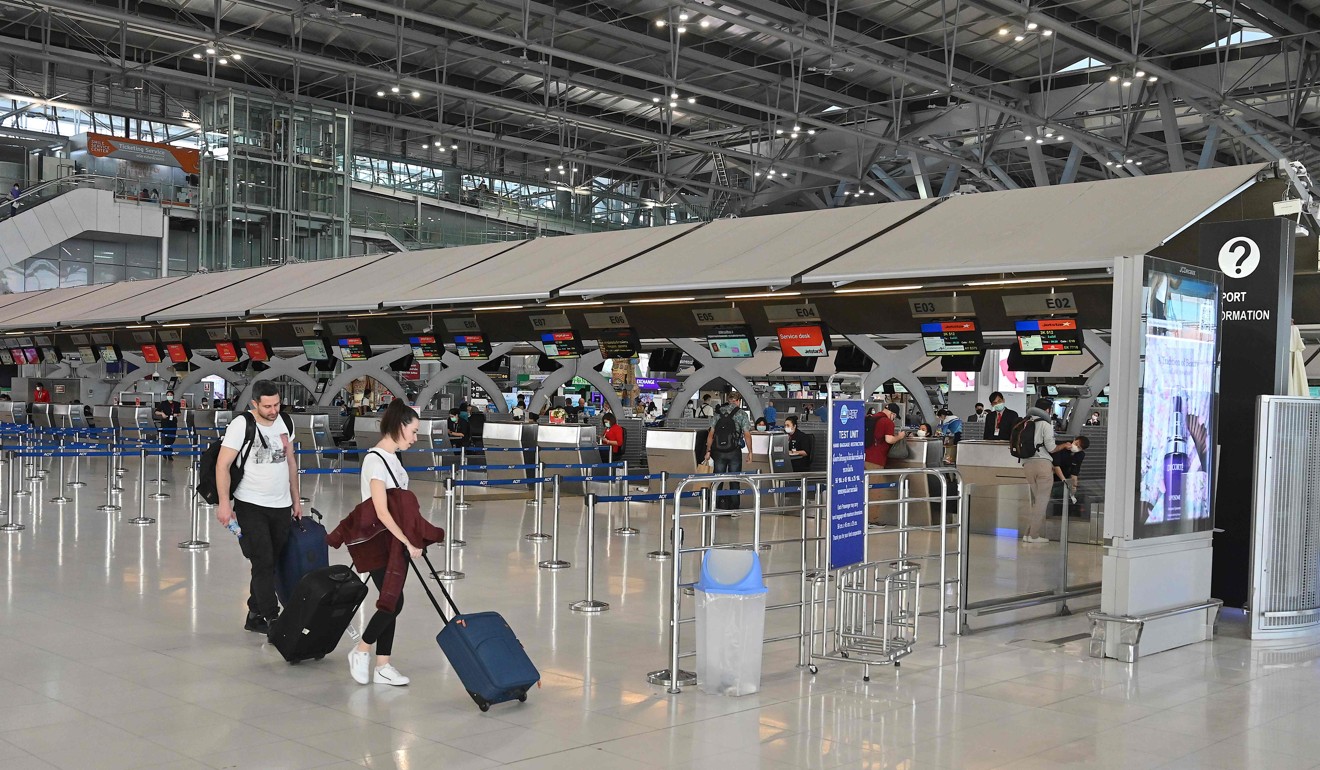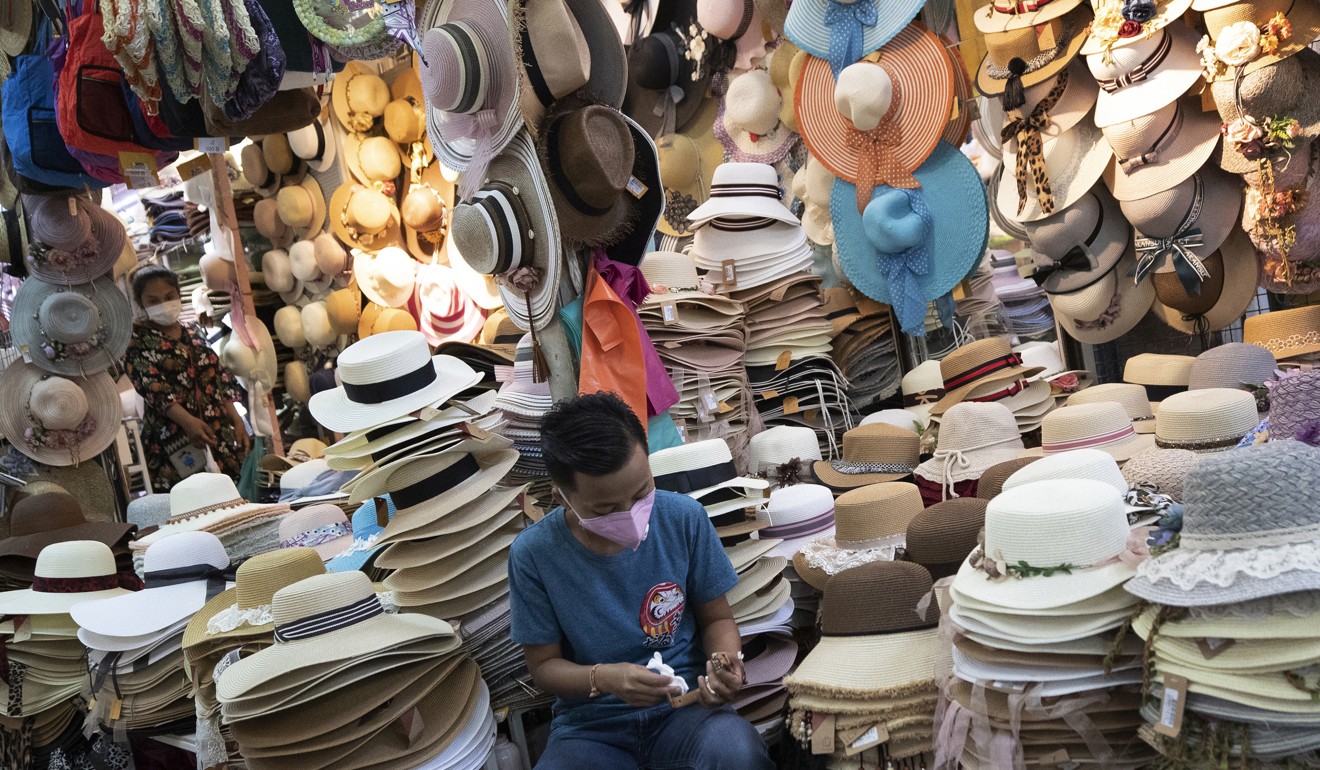
Coronavirus: Thailand suspends visa-free policy but consulate insists Hong Kong not affected
- Travellers from South Korea, Italy and Hong Kong now need visas to enter the kingdom, according to its interior minister
- However, the special administrative region’s Thai consulate later released a statement saying travellers from Hong Kong and Macau were still exempt

Thailand’s interior minister on Wednesday said it would suspend its visa exemption policy for travellers from Hong Kong, South Korea and Italy, and stop visa-on-arrival applications from 18 countries including mainland China and India, as the kingdom ramps up efforts to check the spread of the novel coronavirus.
Travellers from these destinations will have to apply for a visa at Thai embassies and present a medical certificate proving they are free of Covid-19, the illness caused by the virus.
“These measures will solve the problem of foreigners arriving from risky zones,” Minister of Interior Anupong Paochinda told reporters, adding that he would start the process immediately but it was not immediately clear when the restrictions would take effect.
However, the Thai Consulate-General in Hong Kong later released a statement insisting the visa exemption for travellers from the city, as well as those from Macau, would remain in place.
Government spokesperson Narumon Pinyosinwat told This Week in Asia that Thailand’s Foreign Affairs Ministry would work out bilateral agreements in due course to comply with the interior ministry’s new regulation.
She also said the visa policy changes announced Wednesday were in addition to the rules already imposed on travellers entering Thailand from mainland China, Hong Kong, Macau, South Korea, Italy and Iran, which have been deemed “dangerous communicable disease areas”.
Since last week, travellers from these six locations have had to show a medical certificate to prove they are in good health before boarding a flight to the kingdom. Thailand’s aviation authority has instructed airlines not to issue boarding passes to those attempting to travel without a certificate.
Narumon confirmed that these travellers would also have to quarantine themselves for 14 days once they arrive in Thailand.
The country’s Public Health Ministry said visitors were required to disclose their self-quarantine locations and contact details to the government, or face an initial fine of 20,000 baht (US$634) followed by a one-year jail term for repeated failure to comply.

“We are beginning the mandatory quarantine first with those who have health certificates from those countries,” Narumon said. “We think that with the health certificates requirement, their number would be controllable enough for the health ministry’s staff to check on them, either at the hotel or via an app.”
The confirmation comes after days of confusion about the quarantine requirement, with government agencies in Bangkok and Thai consulates overseas saying different things.
Major travel agencies in Hong Kong, including Hong Thai Travel Services and WWPKG Holdings, have already cancelled tours to Thailand following the Thai government’s announcement of quarantine measures.
Hong Thai has cancelled all of 30 of its planned Thailand tours for March, involving about 800 travellers, while WWPKG has cancelled more than 10 tours involving 250 travellers.
Chairat Trirattanajarasporn, president of the Tourism Council of Thailand, said the quarantine measure would help “create domestic confidence, and most travellers would cancel their trips upon hearing this announcement but it should be good in the long run”.
He added that the council had reduced its target for visitors this year from almost 40 million people to 30 million, “in case the number rebounds by July-August”.
However, La-erd Boongsrithong, president of Thailand’s northern hotel association, said the quarantine measure raised more questions than answers.
“Does it include those who booked for a two-night stay and will have to extend their stay to 14 days?” she asked. “How would this be implemented without travellers’ consent? How can hotel operators handle travellers who have health certificates at the time of the boarding but later develop a fever?”
La-erd said while hotels would need to seek more clarification from authorities, they would be willing to comply with the quarantine requirement even though establishments in the country’s north had seen visitor arrivals drop by 80 to 90 per cent since the coronavirus outbreak.
This was particularly evident, she said, in Chiang Mai, where some 2,000 hotels have had to advise their employees to take leave without pay. “Some smaller hotels have shut down to avoid fixed costs of water and electricity, but many will hold out for as long as a few months before considering what to do next.”
Six new cases of Covid-19 were confirmed in Thailand as of Wednesday, including two immigration officers at Bangkok’s main airport and a Singapore national who owns a restaurant in the capital, bringing its total to 59.
Authorities said the two officers at Suvarnabhumi Airport could have handled the passports of visitors to the kingdom. The men fell ill on March 7 and 8 respectively.
One of the officers was among a team leading health screenings of Thai returnees from South Korea, which has reported the second most Covid-19 infections in Asia after China.

“They were not working at the same spots,” Sopon Iamsirithaworn of the Disease Control Department said. “There is a chance they came into contact with foreigners or touched passports.”
The deadly coronavirus has hammered Thailand’s tourism sector, upon which the country is heavily reliant, costing it billions of dollars – mainly after Chinese tourists were quarantined on the mainland or stayed at home.
To mitigate this, Thailand on Tuesday announced a 400 billion baht (US$12.68 billion) economic stimulus package that includes low-interest loans, extension of debt payments and tax rebates.
“The measures will help with the cash flow for businesses to a certain extent, especially now when there is no demand in the tourism market,” said Kasikorn Bank economic analyst Varithorn Sirisattayawong.
“At this time the quarantine measure would not have a significant impact on the tourism industry because the impact has been felt since the beginning of the outbreak,” she said. “March and April will be the most challenging months, because there were remaining bookings in January and February.”
Thailand has cancelled some celebrations for Songkran, or the traditional Thai New Year, that were scheduled for April.
Bangkok this week called off Songkran festivities in the backpackers’ street of Khaosan Road and the Silom financial district, while the Bangkok Post reported that Chiang Mai and Hat Yai have also cancelled their events.
Additional reporting from Agence France-Presse, Phila Siu and Reuters